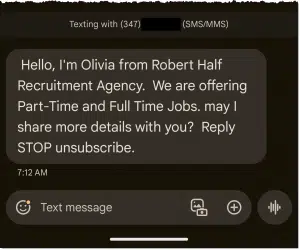Besides getting frustrated, that is.

This is a question I received not long ago from someone who was receiving unwanted calls. I, too, get unwanted calls and texts.
As we enter a busy political season here in the U.S., I expect things to get worse before they get better.
Let’s look at what few options there are.

Dealing with phone spam
To fight phone spam, register with the Do Not Call list if you’re in the U.S. Don’t answer unknown calls or texts, and use your phone or carrier’s spam-marking features. You might also consider using call-blocking apps for additional filtering.
The Do Not Call list
In the United States, at least, there’s something called the Do Not Call List or Do Not Call Registry. It’s maintained by the FTC at donotcall.gov.
We registered both our landline and mobile phones some years ago. As part of researching this article, I verified that they’re still listed.
However, there’s a huge problem with the Do Not Call list: it doesn’t apply to everything I want stopped. The list tells telemarketing companies what numbers not to call. If the company doesn’t follow the law, the list can’t do anything about it. Also, after you register, other types of organizations may still call you, such as charities, political groups, debt collectors, and surveys.
That the lawmakers who enacted this registry carved out an exception for political groups is particularly annoying. Those are the calls I’m getting, and those are the calls I wish would stop.
Step 1: Don’t answer
The single most important thing you can do? Do not answer phone calls from numbers you don’t recognize.
If it’s important to them, they’ll leave voicemail.
If it’s important to you, you can call them back.
You could go to the effort of assigning unique ringtones to the people you care about so you can recognize that the call is from someone you know.
But the bottom line remains: don’t pick up. The phone still rings, of course, but don’t pick up.
Step 1a: Don’t respond
This is a variation on not answering a voice call. Don’t respond to SMS text messages you get from people you don’t recognize.

Even if the message includes the phrase “reply STOP to unsubscribe”, don’t do it. Just like email spam, it could be used as a sign that they’ve reached a real person, which could result in more messages, not less.
Many unsolicited text messages are the first step in a scam. It looks like a message intended for someone else, so you reply to be courteous. (Don’t.) The person at the other end tries to engage you in conversation, which they’ll milk for as long as possible, strengthening the fake “relationship” to the point where… all of a sudden they need money.
Bottom line: Don’t respond.
Step 2: Mark as spam
If your phone provider offers the ability, mark the call or text as spam. This will often block the number at the same time. I do this for all calls and text messages that make it through to me (including those I’ve not answered).
If your provider offers the feature, let them scan incoming calls and text for spam. Much like a spam filter in email, the provider builds databases of numbers known to spam, and using that (and a few other heuristics, I’m sure), proactively marks things as spam for you. You might hear a single ring and then find the call in your call history marked as spam. My provider right now does a good job of this.
The problem, of course, is the same as with email: spam callers change numbers frequently. You might block one number only to be called by the same party using a different number. And, again, just like email, there’s nothing to do about this other than marking it as spam.
Step 3: Block
If marking it as spam didn’t do it, or the spam feature is not available, then see if you have the option to completely block calls from that number.
Even though I just said that spammers change their numbers, the good news is that the pool of numbers they can change too is much smaller than the email addresses spammers can make up. As a result, while not completely effective, it can still help somewhat.
Step 4: Report (optional)
I mention this as optional because I’m not certain it’s worth the effort.
In the U.S., the Do Not Call Registry allows you to report unwanted calls. Presumably, they use this to take action against organizations not paying attention to the list.
The reason I’m skeptical is this: numbers are easy to spoof these days with VoIP, and many come from overseas where the government has no jurisdiction.
But if it makes you feel better, go ahead and report ’em.
Step 5: Download a call-blocking app (optional)
There are several apps that you can download to augment your phone or carrier’s spam-fighting features. In most cases, they crowdsource reports of spam calls to make their service more accurate.
The most recognizable one is NoMoRobo, a popular service that works well with mobile phones and some (VoIP) landlines.
The only downside here is that there’s typically a fee.
Step 6: Be careful with your number
One way to cut down on unwanted calls is to limit the exposure of your phone number.
I find this relatively difficult to do, especially after the fact. As it turns out, many of the places I need to use my phone number are places that then share that information with others, are public records, or end up being the folks that call me.
But it’s good practice to think twice before handing over your phone number to untrusted or unknown sources.
Do this
Get on the Do Not Call Registry if you’re in the United States. It won’t stop everything, but it will stop a lot.
Don’t answer calls or texts from unknown numbers.
After that, the advice boils down to exactly what I say for email spam: mark it as spam and get on with your life.
More advice: Subscribe to Confident Computing! Less frustration and more confidence, solutions, answers, and tips in your inbox every week.




I tried reporting a spam call from a politician but I was told, politicians are exempt from that law. The next time I got a call from a politician, I blasted the caller and told her she’s just convinced me to vote for her candidate’s opponent. I ended up voting for him anyway, but I had fun. I am extremely rude to those people to discourage them from doing that job. I’ve been told you can’t blame them. It was just their job. I ask them if they would let a hit-man off the hook because it was just his job.
Maybe have a second phone number to give out to places that really don’t need your real/main phone number. You can buy a Wi-Fi only phone number for a few dollars/month and install the companion app on any mobile device, even a tablet. If that device is off-line, no phone calls for sure.
I use Google Voice numbers for this kind of thing.
I set my phone to Do Not Disturb from 7:00 PM to 7:00. that way I get calls from priority or “starred” contacts only. Such as important work contacts and family members.
I’m surprised you didn’t mention a feature built-in to iOS on iPhone:
Settings -> Phone -> Silence Unknown Callers -> On
This sends all calls that are not from a number in your contacts directly to voicemail. Then, as per your step 1, they can choose to leave a message and you can choose to call them back. Or not! If it’s going to be a regular caller you just add the number to your contact.
With this the only way to get a spam call is from someone spoofing one of your contacts – possible but extremely unlikely.
I also use some other measures but this simple setting makes a huge difference for my iPhone using relatives, friends, and clients.
My Android phone (Google Pixel 4a on Google Fi with Android 13) has similar settings under
Phone App -> vertical … menu -> Settings -> Spam & Call Screen -> Call Screen
Call “Screening” is not as effective as just sending straight to voice mail but I have this phone on Do Not Disturb at all times anyway.
Ask Leo is a Windows help site. Leo’s expertise is primarily in PCs, Windows, and general Internet or computing-related questions. We just don’t have the expertise to do justice to most Apple Macintosh, iPhone or iPad-related,or even Android questions.
In the UK you can register your number with TPS – they actually have some teeth and have been known to fine companies who send you too many spam calls. It’s not foolproof but does help: https://www.tpsonline.org.uk/register/
Most UK carriers have anti-spam functions too allowing you to block and prevent unknown calls and texts and their databases are reasonably up to date.
I have a home phone, connected using MajicJack’s VoIP service, and an Android smart-phone. My home phone is what I use primarily. MajicJack includes an Automated Call Screening feature that, when activated, requires the caller to enter a single-digit number for the call to be connected. This eliminates all robocalls so far, at least in my experience, and I never answer any call from an unknown number, unless I’m expecting it (from Medicaid, etc.).
On my smartphone, I make outgoing calls, but I seldom receive incoming calls, and I never answer calls from any number I don’t recognize. As for call-blocking, I don’t use it because in my experience, it’s not worth the bother. I get the best results over time by ignoring calls/texts from unknown numbers/sources and doing little else, other than clearing my call history and message list monthly.
These are the things I do, and they work well for me. Both of my phones are active/on 24/7, and I get very few spam calls, if any.
Ernie (Oldster)
Regarding the Do Not Call Registry, also excluded are companies and businesses you have done business with. If you call that phone number you see on TV for more information (usually an 800 number – call for no obligation), you have now done business with them and they can call you.
Leo mentioned, “Step 1: Do not answer phone calls from numbers you don’t recognize. If it’s important to them, they’ll leave voicemail.”. Two problems with that. (1) CallerID can be spoofed. (2) Going to voicemail tells the caller has reached a legitimate phone number.
What I often do when I get a phone call is to answer using the speaker phone button AND I immediately press the mute button. I do this before my answering machine answers. Of course, you need a phone with a speaker phone option and mute capability. What this does is it mutes the phone so the caller does not hear anything. The caller (or robo machine) will hear dead air… as if they reached a dead line. If a real person IS on the other end, they’ll probably say “Hello”… “Hello”… “Hello. Anyone there?”. If I recognize the voice I’ll unmute the phone and talk to them. Otherwise, I’ll wait for the phone connection to disconnect before I hang up.
In the UK you can forward Spam to 7726. You get an auto response asking for the sender’s number. The phone operator then should take steps to block the sender centrally.